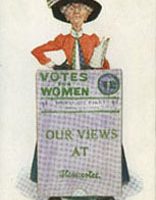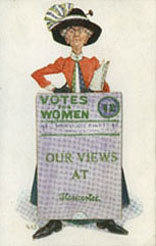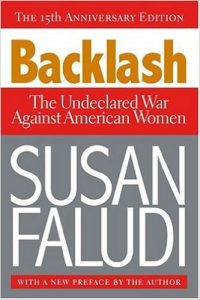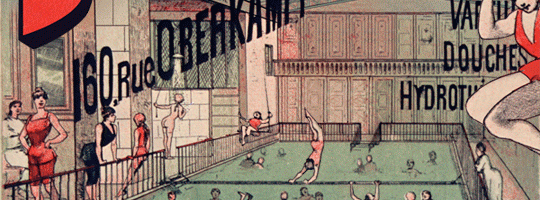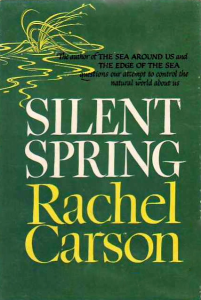“In the spirit of collaboration and mutual support, a working group of faculty, students and staff members selected “Women’s Power, Women’s Justice” as a 2016-2017 intellectual theme that reflects faculty-led interest that we hope will permeate the campus community and conversations throughout the academic year.”

In conjunction with this year’s theme, students, staff and faculty will be participating in the campus-wide Combatting Anti-Blackness Against Women and Girls Initiative. To quote 2016 Colorblind Racism Summit keynote speaker Charlene Carruthers ’07, anti-blackness is “a system of beliefs and practices that destroy, erode and dictate the humanity of black people; the belief that there is something wrong with black people.” The objectives of this initiative are to:
- commit to combatting anti-blackness against black women and girls
- build community through the celebration of black women and girls
- create cross-disciplinary expressions of love and appreciation through scholarship
This initiative, in an effort to support the theme of “Women’s Power, Women’s Justice”, is a celebration of Black women and girls. In keeping with IWU’s mission of commitment to diversity and social justice, this community will actively engage in curricular and co-curricular activities related to specifically to combatting anti-blackness against women and girls in our shared learning and living spaces and beyond.
Controversy at the Hugo Awards
- The Hugo Awards are given annually in several categories of publications in science fiction and fantasy.
- In 2015, a group known as the “Sad Puppies” decided to lobby for a slate of writers and publications that aligned with their own view of how scifi/fantasy ‘should be’.
 The effort was seen as “a rebuke to the women, people of color, and LBGTQ folks seeking a place in the science-fiction/fantasy world” (Slate, 2016) and
The effort was seen as “a rebuke to the women, people of color, and LBGTQ folks seeking a place in the science-fiction/fantasy world” (Slate, 2016) and - While some of the works put forth by the Sad Puppies were shortlisted and went on to win Hugo Awards, there was a backlash against the effort.
- In some categories, authors declined their nominations in protest of the Sad Puppies’ effort, and others publicly decried the group itself.
- Voters also had their say in 2015: “Voters opted to give “no award” in the five categories wholly overtaken by puppy nominees.” (Slate, 2016)
- In 2016, the Sad Puppies put forth a list of recommendations for awards, and although some of the works on their list won awards, the wins were attributed not to the Puppies, but to the high quality of the works.
- The winner of the 2016 Hugo for Best Novel was N.K. Jemisin for “The Fifth Season.”
- In an interview with The Guardian, Jemisin said: “It’s human nature that we come in our own flavours,” fantasy author NK Jemisin tells the Guardian, “and it doesn’t make any sense to write a monochromatic or monocultural story, unless you’re doing something extremely small – a locked room-style story. But very few fantasy worlds ever do that. In fact, epic fantasy should not do that.”
In honor of NK Jemisin, this year’s winner of the prestigious Hugo Award, The Ames Library is proud to highlight the works of Jemisin and other black women science fiction and fantasy authors. All these books are available to check out, so please help yourself!
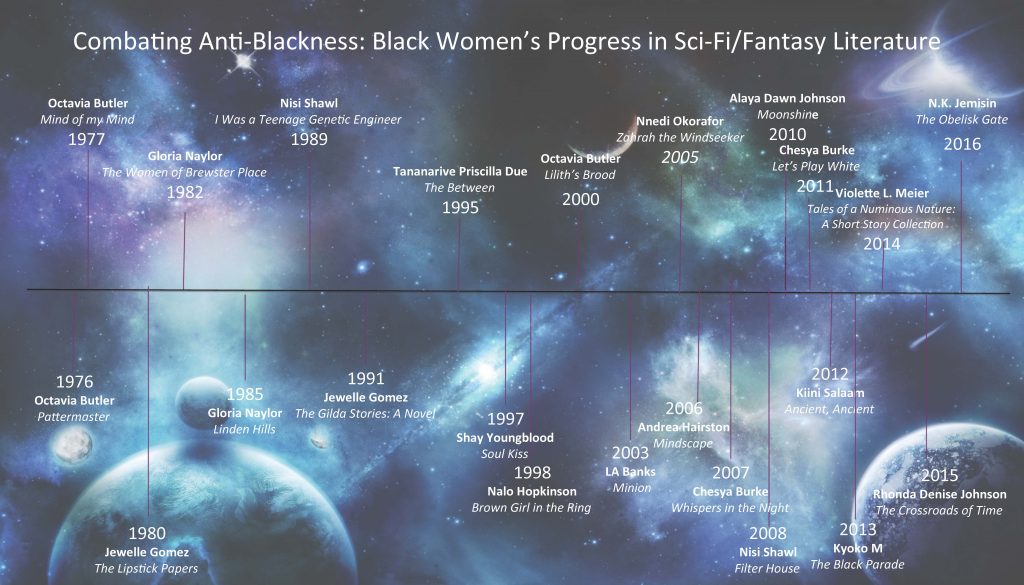
Katy Waldman, “Oh No, the Puppies Are Back for the 2016 Hugo Awards—and As Angry As Ever.” Slate, April 29, 2016. Accessed September 13, 2016 at http://www.slate.com/blogs/browbeat/2016/04/29/sad_and_rabid_puppies_are_trying_to_game_the_hugo_award_shortlists_again.html
Many thanks to Annie Harb, for her hard work assembling a full list of black women authors in the science fiction and fantasy genres, for her work identifying titles to buy, and for the creation of the awesome timeline featured above.

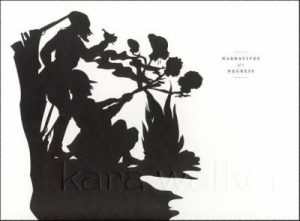 Narratives of a Negress, “accompanied an exhibition organized by the Tang Tang Teaching Museum and Art Gallery at Skidmore College and the Williams College Museum of Art, presents a comprehensive overview of Walker’s work, beginning with her first cut-paper wall installation, Gone, An Historical Romance of a Civil War as It Occurred between the Dusky Thighs of One Young Negress and Her Heart (1994). Other highlights include the 1996 series of twenty-four watercolor drawings, Brown Follies, which is reproduced in full as an artist’s book within the book, and installation views of many of Walker’s exhibitions. Recent drawings and projections are also featured. Throughout the book are a selection of the Walker’s writings reproduced as they were created typed on index cards. These writings reveal a rarely seen side of the artist, whose words are as provocative as her installations and drawings. The essays discuss Walker’s place in art history, formal and narrative readings of her work, her relation to culture at large, and issues of race, sexuality, and representation addressed in her work.”
Narratives of a Negress, “accompanied an exhibition organized by the Tang Tang Teaching Museum and Art Gallery at Skidmore College and the Williams College Museum of Art, presents a comprehensive overview of Walker’s work, beginning with her first cut-paper wall installation, Gone, An Historical Romance of a Civil War as It Occurred between the Dusky Thighs of One Young Negress and Her Heart (1994). Other highlights include the 1996 series of twenty-four watercolor drawings, Brown Follies, which is reproduced in full as an artist’s book within the book, and installation views of many of Walker’s exhibitions. Recent drawings and projections are also featured. Throughout the book are a selection of the Walker’s writings reproduced as they were created typed on index cards. These writings reveal a rarely seen side of the artist, whose words are as provocative as her installations and drawings. The essays discuss Walker’s place in art history, formal and narrative readings of her work, her relation to culture at large, and issues of race, sexuality, and representation addressed in her work.”


